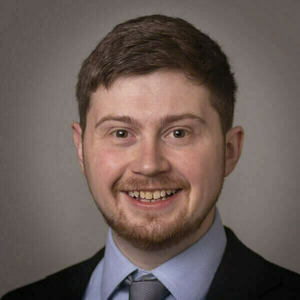Faculty Luncheon: "Bayesian Optimization and Adaptive Experiment Design for Additive Manufacturing of Thermoelectric Materials and Devices" by Alexander Dowling

ND Energy Faculty Luncheon Seminars are held monthly with interested faculty to facilitate cross-disciplinary research collaborations and to enable development of proposal ideas for upcoming funding opportunities. All interested faculty from diverse fields are invited to attend.
The discussion topic for this luncheon will be centered around a presentation by Prof. Alexander Dowling, assistant professor in the Department of Chemical and Biomolecular Engineering, titled "Bayesian Optimization and Adaptive Experiment Design for Additive Manufacturing of Thermoelectric Materials and Devices."
This 35-40 minute talk will be followed by discussion with Prof. Dowling focused on (1) cross-disciplinary basic research needs, (2) potential avenues for external and internal collaborations, (3) funding sources to target, and if everyone is agreeable, (4) 'follow-up actions' that we can track. With all the faculty engaging in the discussion part of this luncheon after the talk, we expect to have a very stimulating and inspiring exchange of ideas.
For more information on the ND Energy Faculty Luncheon Seminars, contact Subhash L. Shinde at sshinde@nd.edu.
Abstract
Discovering and manufacturing functional materials with precisely tuned properties is a central goal of material science and engineering; yet materials discovery and additive manufacturing optimization is often slow and expensive. For example, novel solid-state thermoelectric (TE) materials have the potential to improve energy efficiency by converting waste heat into electricity. However, the performance of many state-of-the-art TE materials remains inadequate for adoption beyond niche applications. Current efforts to optimize sintering, an important step in additive manufacturing of TE devices, rely on expert-driven trial-and-error search which is often extremely time-consuming and without the guarantee of improvement.
In this talk, we argue Bayesian optimization (BO) and related data science and machine learning frameworks offer principled approaches to intelligentially recommend optimized experimental conditions by balancing exploitation and exploration. Specifically, we show successfully application of BO to materials composition (ink formulation), printing, and sintering steps in the additive manufacturing of n-type and p-type TE materials. We highlight the role of “systems thinking” to synergistically fuse human intuition and BO machine learning models, ultimately resulting in the synthesis of record-breaking TE materials with under forty experiments. Finally, using thickness control in aerosol jet printing as a case study, we show how incorporate physical informational into data-driven models requires fewer experiments than black-box machine learning for precise model-based control. This talk is based on collaborative work between Profs. Tengfei Luo, Yanliang Zhang, David Go (AME), Alex Dowling (CBE), Dr. Subhash Shinde (ND Energy), and Dr. Michael McMurtey supported by the U.S. Department of Energy's Office of Energy Efficiency and Renewable Energy (EERE) under the Advanced Manufacturing Office Award Number DE-EE0009103.
Biography
Alexander W. Dowling is an Assistant Professor in Chemical and Biomolecular Engineering at the University of Notre Dame and hold a concurrent appointment in Applied and Computational Mathematics and Statistics. His research combines chemical engineering, computational optimization, and data science to enable principled molecular-to-systems engineering of sustainable energy and environmental technologies. Applications areas include energy markets and infrastructure, carbon sequestration, shale gas utilization, water treatment, recovery of critical materials, and advanced separations (membranes, ionic liquids). In these areas, Prof. Dowling actively collaborates with seven U.S. national laboratories (NETL, SNL, LBL, INL, NREL, LANL, PNNL) and over ten research groups at Notre Dame. Honors include an NSF CAREER Award in 2019 and two R&D 100 awards. He holds a B.S.E from the University of Michigan - Ann Arbor and Ph.D. from Carnegie Mellon University, all in chemical engineering.